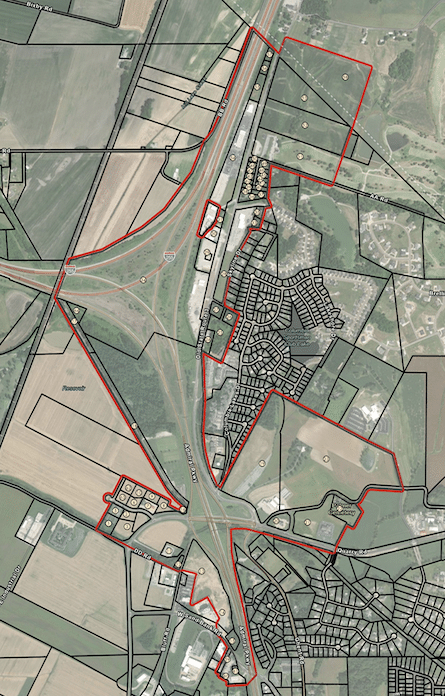Columbia biz district gets OK

In contrast to two lengthy public hearings about a proposed business district in the northern part of Columbia covering several hours, the same topic was discussed and approved within minutes during Monday night’s city council meeting.
A second public hearing on the issue was held March 4 but was continued to Monday due to an overwhelming amount of public input.
The only person to speak Monday night, though, was Top Shooters Sports Bar owner Tim Wheeler.
Wheeler, who at times expressed displeasure with the city’s approach to the business district during previous hearings, had a change of heart Monday night.
“The last time I was up here, I was pretty critical of the city,” Wheeler began. “Working for the last two weeks, I can say thank you to the mayor (Bob Hill) and (City Administrator) Doug Brimm and (City Attorney) Terry Bruckert for working endlessly to get this done. I appreciate the hard work. I think we did something really good.”
During previous hearings, a number of issues were raised, including citizens concerned about residential properties being seized by the city through eminent domain and the possibility of the city using funds for projects not related to parcels within the district boundaries.
Concerning residential parcel concerns, the city removed any mention of “eminent domain” from the business district documents.
During the March 4 meeting, city officials outlined how business district funds would be utilized.
For the most part, district funds will be used to make public improvements to infrastructure and transportation within the district or to assist developers with costly projects which could potentially hinder development.
During the last hearing, Bruckert explained reimbursement of funds to businesses was contingent on a business’ ability to generate income.
He explained projects for individual businesses are paid for only out of business district taxes brought in by that business, explaining that it was “rare” for a single business to be funded by business district taxes raised through a separate business within the district.
On Monday, Brimm began the discussion by updating the council on how the city has addressed concerns since the March 4 hearing.
“Several meetings were held between staff, elected officials and various affected businesses within the proposed district,” Brimm said. “As a result of these discussions, one parcel has been removed from the proposed district boundary… with an address of 603 Old State Route 3. This is the location of R&M Oil & Supply.”
R&M Oil owner Lisa Braun spoke during the March 4 hearing. She said the additional business district taxes would have a severe negative impact on her business, so much so that she said she would move the headquarters from Columbia to a Monroe County property south of the city rather than pass an additional cost on to customers.
Aldermen unanimously approved the amended district as well as the taxes to be imposed within the district.
Ward I Alderman Jay Riddle abstained from both votes. Riddle is currently employed as an office manager with R&M Oil.
The taxes to be collected within the newly-established district would go into effect July 1.
New taxes include an additional 1 percent sales tax on items purchased from businesses within the district as well as a 1 percent service occupation tax described as a tax on “the selling price of all tangible personal property transferred by such serviceman as an incident to a sale of service.”
Also, there will be an additional 1 percent hotel operator’s occupation tax for the “renting, leasing or letting of hotel rooms within the business district.”
During prior discussions, officials disclosed there has been interest in developing an auto dealership, restaurants and at least one hotel within this business district.
The 1 percent sales tax would not apply to vehicle sales or the sale of any property which is titled or deeded through the state.
Another item from the March 4 meeting was settled Monday night as aldermen approved regulations for “short-term rental property” within Columbia city limits.
An issue regarding lack of oversight of rental of personal residences through online sites such as Air BNB and VRBO was brought up several years ago, although at the time there was no feasible way to control such rentals.
With the ordinance passed Monday night, only buildings within Columbia’s C-2 business district – which is mostly along the Main Street corridor – will be allowed to provide short-term rental services.
A point of contention during the March 4 meeting was the amount of properties which would be allowed to provide such services.
Initially, a limit of five permits each for the three types of short-term rentals was considered, but Brimm advised aldermen he would research how many properties would be allowed if a limit of 20 percent of eligible parcels were to be the cap.
Monday night, Brimm said it was decided to let the market dictate how many permits would be issued, meaning there would be no cap.
Anyone wishing to obtain a short-term rental permit – which are now only allowed as special use within C-2 zones – will now need to apply through the city and have a public hearing through the Columbia Plan Commission before the request could be considered by city council.
The amendments to the city code were approved unanimously.
Also during Monday’s meeting, Baxmeyer Construction was awarded the low bid for the upcoming Carl Street Bridge Replacement Project in the amount of $648,597.77.
At the beginning of Monday’s meeting, Columbia Public Library Director Annette Bland addressed the council, giving an update on library growth in the past few years and current programs and services offered by the library.
It was also announced that Bland would be retiring in May after serving as library director for 32 years.
Hill also spoke about the upcoming implementation of a “GOGov” app which will allow residents to easily access city information from a smart phone and other mobile devices. The expected launch date is April 1.
Through the app, residents will be also able to communicate with city officials regarding potential problems, such as the ability to submit pictures of potholes or possible ordinance violations like grass which exceeds city length limits.
The app will also show a “chain of custody” showing who has seen or addressed issues or comments, Hill said.






